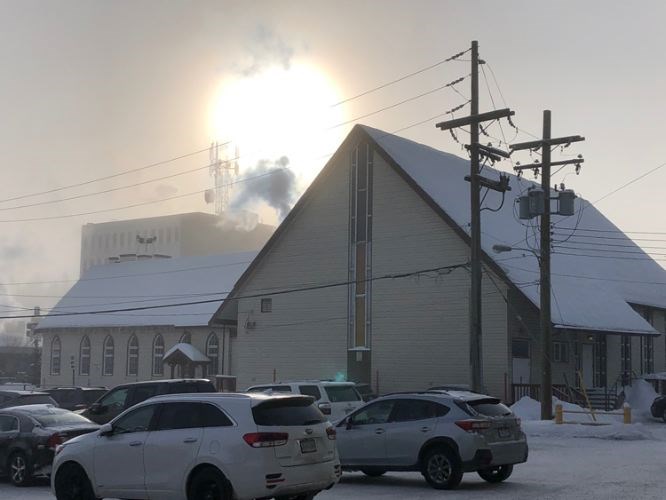Extreme cold weather and poor air quality have prompted Environment Canada to extend a pair of public alerts.
Temperatures dropped to -43 C overnight and remained at -42 C as of 10 a.m. The extreme cold weather warning effected the entire region, including communities as far south as 100 Mile House, west to the Bulkley Valley region and north to the Yukon border
"Bitterly cold arctic air will continue to remain entrenched over the area today," Environment Canada's alert said. "Extreme cold puts everyone at risk. Frostbite can develop within minutes on exposed skin, especially with wind chill."
In addition, the cold weather has created stagnant weather conditions, resulting in elevated air pollution levels.
The 24-hour average concentration of ultra-fine particulate matter (PM 2.5) was 33.1 micrograms per cubic metre of air, above the provincial acceptable standard of 25 mircrograms per cubic metre. PM 2.5 levels peaked at 75 micrograms per cubic metre early Wednesday morning, before dropping down to 20.7 by 10 a.m.
"People with cardiovascular disease can be particularly sensitive to air pollution," the Environment Canada advisory said. "They will generally experience more serious health effects at lower levels. Pollution can aggravate the disease leading to increased medication use, doctor and emergency room visits, and hospital visits."
The City of Prince George's Clean Air Bylaw prohibis all open burning and recreational fires during an air quality advisory. The use of wood-burning appliances, except for people who depend on wood stoves as their sole heat source, are also prohibited.
City crews hit by cold
City crews were working to repair a pair of water main breaks, one of which is linked to the cold weather.
On Wednesday morning a 15 cm water main burst downtown on Sixth Avenue between Winnipeg and Vancouver Streets.
"The city believes that the cold did play a factor in the break, due to the old age of the utility, which was installed in 1956, and its relatively shallow depth," a city press release said. "City crews have reduced the water flowing in the main, which has resulted in a reduced, but not completely stopped water flow, to buildings in the area. The city also anticipates that it will take extra time to repair the main and return water service to full capacity due to the extremely cold temperatures."
Another water main break occurred just before noon in College Heights on Southridge Avenue between St. Anne Crescent and St. Lawrence Avenue. While the cold weather isn't considered a factor in the break – the line built in 1992 is well below the frost line – the cold weather is slowing down city crew's ability to repair the line.
"The operation will be undertaken as soon as possible, but could be completed as late as the end of the day on Thursday, when the temperature is forecasted to rise," the city press release said.
Snow and ice control operations were also suspended for 24 hours on Wednesday to prevent damage to the city's fleet and contractor equipment due to the extreme cold.
The west entrance to the Four Seasons Pool, located by the parking lot, is closed for the duration of the extreme cold. The opening and closing of the door causes high levels of fog in the building and is effecting the temperature inside the building.
The Dominion Street entrance remains open as usual.



